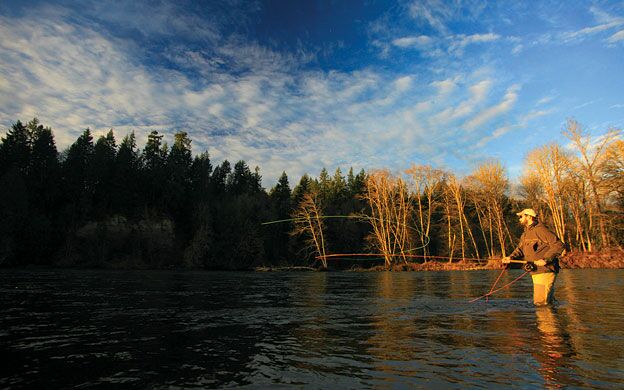Processing Your Payment
Please do not leave this page until complete. This can take a few moments.
- News
-
Editions
View Digital Editions
Biweekly Issues
- December 15, 2025
- December 1, 2025
- Nov. 17, 2025
- November 03, 2025
- October 20, 2025
- October 6, 2025
- + More
Special Editions
- Lists
- Viewpoints
-
Our Events
Event Info
Award Honorees
- Calendar
- Biz Marketplace
Lucas St. Clair eyes a North Woods national park
 PHOTo / Courtesy Elliotsville Plantation Inc.
Lucas St. Clair, son of entrepreneur Roxanne Quimby, flyfishes on his land in northern Maine. St. Clair, a Dover-Foxcroft native, is using home-grown values to land support for a new version of a national park in Maine.
PHOTo / Courtesy Elliotsville Plantation Inc.
Lucas St. Clair, son of entrepreneur Roxanne Quimby, flyfishes on his land in northern Maine. St. Clair, a Dover-Foxcroft native, is using home-grown values to land support for a new version of a national park in Maine.
Bob Myers remembers an exhilarating snowmobile ride last winter with Lucas St. Clair through a tract of land in northern Maine east of a proposed national park near the east branch of the Penobscot River. It was a terrific year for snowmobiling, with a long season and lots of snow, and the two men had a good time traversing the land, which is owned by St. Clair, recalls Myers, executive director of the Maine Snowmobile Association in Augusta. But when talk turns to a northern national park, his and St. Clair's paths diverge.
“I just don't buy it,” explains Myers, who says he's had many conversations about finding middle ground on the project with both St. Clair and his mother, Burt's Bees co-founder Roxanne Quimby, who initially proposed the national park. “I don't see how adding the federal brand [of a national park] will improve things up there. It's a great place to fish and hunt, but there's nothing special up there. It's nothing like going to the top of Cadillac Mountain [in Acadia National Park] and having jaw-dropping views. It doesn't lend itself to a national park.”
But St. Clair, who is president of the board of directors of Elliotsville Plantation Inc., the foundation that owns the land near Baxter State Park, is once again trying to earn support for the controversial park. It could be as large as 75,000 acres of national park and an equal amount for a related recreation area. Since Elliotsville Plantation is a little less than 130,000 acres, the foundation will continue to buy land, St. Clair says. There are no specifics on the exact size nor the boundaries as of yet, he says, as a firm plan still is not in place. There's also no timing on moving ahead with the park. But St. Clair is clearly in motion.
Coffee klatch campaigning
St. Clair may only be in his mid-30s, but he's using old-style campaigning to earn the trust and support of local constituents for the park. Sleeping in a van, knocking on doors and stopping fishermen and hikers in the forest, he's gone back to basics for the past year-and-a half to establish common ground with people in the Mt. Katahdin and Baxter State Park area. For St. Clair, establishing the national park is a mission to save the region's natural resources and expand economic growth. He says he thought about a state park, but Baxter State Park already is there, and he wants the “gold standard” brand of a national park that can bring in people from all over the world.
“I grew up in rural Piscataquis County, where I fished for trout and hunted birds,” says St. Clair, who was born in Dover-Foxcroft and grew up in Guilford. “So I am trying to build a relationship with a connection over shared values, and then talk. There's a trust-building that has to occur.” St. Clair says he takes every meeting he can get, especially with the most extreme opposition.
His consensus-building approach stands in stark contrast to the confrontational exchanges his mother had with opponents to her earlier proposal for a 70,000-acre park. It was taken off the table by St. Clair last fall after it ran into opposition from Maine's two U.S. senators, Gov. Paul LePage, and U.S. Rep. Mike Michaud, as well as various forest products and recreational groups. Opposition revolved around giving the federal government power in the area, harming local manufacturers and preventing sports enthusiasts from accessing long-used areas.
Naysayer Myers describes St. Clair as a good guy who is very sincere.
“He's trying to reach out to people and make this palatable,” he says.
But so far, St. Clair has not changed the mind of Myers, who worries about losing access to the land, which he says could happen if the federal government imposes its regulations for the parks and emissions for nearby businesses. He adds that when the federal government is involved in a project, it tends to get larger than originally planned, and environmental groups will step in to limit public access.
“Look to what happened at Yellowstone,” he says. “The battle for snowmobile access to Yellowstone has been going on for 20 years. And now they're letting [a miniscule] 400 snowmobiles a day into the park. That's what we see in Greenville on an average weekend.”
Myers says he's suggested to St. Clair and Quimby that they set up a public-private partnership for the land or simply give it to Baxter State Park, but that they seem focused on getting the “national park” branding.
“Both sides have pretty hardened positions,” he says. “This will drag on forever probably. It's too bad.”
But St. Clair has managed to change some minds.
“Roxanne [Quimby] immediately banned recreational vehicles and hunting, so she got off to a bad start. I was initially strongly opposed to it,” says George Smith, former executive director of the Sportsman's Alliance of Maine and now an outdoor writer. “Then I met with her. As she continued to buy land, she continued to leave open land for hunting. I'm for it now. It's in a much bigger context.”
He adds that the proposal now is not just for the national park, but other lands, most of them open to hunting and other traditional activities.
He says St. Clair hunts and has a feel for the sensibilities of the area.
“Lucas has had a very positive impact. I think it's a much more collaborative approach. If it had started out in this direction, it probably would have been done by now,” says Smith, who acknowledges St. Clair still faces two big hurdles. One is the negative messages about the national park, including limited access to recreate. The second is the involvement of the federal government, which he says has not been a good experience for Maine.
“They're autocratic and dictatorial,” he says. “Very few people want the federal government in the middle of the north woods.”
But St. Clair has people thinking about the national park in greater numbers, he says, which is a start.
“It will take leadership from the state level. You can't have a whole congressional delegation against it,” Smith says. “And you need to get the locals to change.”
Homegrown values
“I relate to the land and the region in a different way than my mom,” says St. Clair, who adds that his mother has stepped away from day-to-day operations of Elliotsville Plantation. “I don't think she would have driven from town-to-town and sat in as many living rooms.”
He says his mother was perceived as a woman from “away” who had the resources to buy the land and then tried to tell the townspeople what to do. What also figured in, he says, were the then-recent memories of the 3.2 million-acre park proposal by the group Restore, which he also opposed.
But for St. Clair, the issue is more about changing a mindset in a region that has experienced only negative results from change.
“In the last 40 years in the Katahdin region, every bit of change has represented something negative, mills downsized, layoffs, benefits taken away, schools closed, children moving away,” he says. “What we're proposing is another change of the use of the landscape, and people who lived through [those other changes] don't want to change.”
He says that because he grew up in the area, he understands the issues, citing a recent afternoon he spent with former classmates.
“Everyone we went to school with has moved away,” he says adding the current resistance is a fear of the unknown in addition to a fear of change.
St. Clair says he's explaining to stakeholders that the park could bring new jobs in the tourism industry, and the recreational area would be open to fishing and hunting as well as provide permanent snowmobile paths.
“I care deeply about Maine and its natural resources,” he says. “I've gone back to streams I fished and seen development and areas where access is denied.”
He says the landscape for the park is the most impressive, intact forest on the East Coast.
“It's a sea of trees with rolling hills, an unbelievable watershed, crystal clear streams, ponds and rivers filled with wild brook trout and salmon,” he says.?He envisions the park as offering special landscapes like the Grand Canyon, Everglades or the Great Sand Dunes. The Elliotsville Plantation has three water flows, the Wassataquiok Stream, the east branch of the Penobscot and the Seboeis River. He calls his current efforts to get local municipalities to recognize the benefits of tourism, “a lot of heavy lifting now. It's a viable industry, as viable as health care or forest products manufacturing.”
He adds that the Bangor area, which is only 65 miles away, has a lot to gain from a new national park, and can “multiply the park experience in Acadia and the north woods. It's a real benefit to Maine.”
New beginnings
Outdoor writer Smith pointed to the benefit of diversifying the economy in northern Maine.
“There are 3 million acres in the northern Maine woods. All recreational user groups over the last 14 years have declined,” he says. “We've lost the deer herd, the paper company jobs are long gone and bear hunting is down because of the economy. I ask, 'When do you start looking at alternatives?'”
He adds that people do recognize that a national park draws people to an area, and that the plan St. Clair has in mind has much broader appeal. Elliotsville Plantation commissioned two economic studies on the potential impact of the park from Headwaters Economics, an independent research group in Bozeman, Mont. One study analyzed the Penobscot and Piscataquis county economies. The other compared the economies of 16 peer communities in the United States that are either near national parks or recreation areas or both. The studies found that the suggested national park and recreation area by Baxter State Park would increase low- and high-income jobs, pull in more visitors and businesses and generate more taxes for Penobscot County than leaving it in its current state.
While the new private-sector jobs projected to be created by the park's presence likely wouldn't transform the region, they could help give it a leg up. The study projected as many as 1,000 jobs, including national park service jobs, and more than 450 jobs based on capturing a share of Acadia National Park visitors and excluding the park service jobs. In 2010, Acadia had 2.5 million visitors, which resulted in more than $192 million in spending on hotels, restaurants, transportation, guides and other local businesses. Those expenditures supported 3,331 jobs directly associated with Acadia Park, 3,147 of them local jobs and 184 National Park Service jobs. Penobscot County could potentially collect $326,126 more in taxes yearly, about 2% of its budget, according to the studies.
Ben Alexander, associate director of Headwaters Economics, noted in a summary of the reports on his company's website that the park's effect on the forest products industry would likely be negligible. The report noted that if 150,000 acres of private land east of Baxter State Park were harvested for timber, few jobs would be created, because 80% of that land could produce at most 120,000 tons of green fiber annually. That translates into 21 jobs to bring the wood to the mills. Including indirect jobs, annual overall timber operations could potentially produce a total of 50 local jobs, according to the reports.
But snowmobiler Myers disagrees. He says jobs will come long term from projects like New England's first torrefied wood facility in Millinocket, which will convert wood waste into biocoal pellets for energy.
“There will be a multiplier effect of forest product jobs down the road,” Myers says. “And timber will pay more than national park concession stand vendors.”
St. Clair intends to keep pressing on.
“I'll keep taking in comments until we have overwhelming support and that washes over to our state congressional delegation, and until they sponsor legislation.”
Read more
Quimby to open 40K acres to hunting
200 Maine businesses support new national park
Collins, King and Poliquin express “serious reservations” about North Woods proposal
Northern Maine: A hot tourist destination?
Mainebiz web partners

The Giving Guide
The Giving Guide helps nonprofits have the opportunity to showcase and differentiate their organizations so that businesses better understand how they can contribute to a nonprofit’s mission and work.
Learn More
Work for ME
Work for ME is a workforce development tool to help Maine’s employers target Maine’s emerging workforce. Work for ME highlights each industry, its impact on Maine’s economy, the jobs available to entry-level workers, the training and education needed to get a career started.
Learn More
Groundbreaking Maine
Whether you’re a developer, financer, architect, or industry enthusiast, Groundbreaking Maine is crafted to be your go-to source for valuable insights in Maine’s real estate and construction community.
Learn more-
The Giving Guide
The Giving Guide helps nonprofits have the opportunity to showcase and differentiate their organizations so that businesses better understand how they can contribute to a nonprofit’s mission and work.
-
Work for ME
Work for ME is a workforce development tool to help Maine’s employers target Maine’s emerging workforce. Work for ME highlights each industry, its impact on Maine’s economy, the jobs available to entry-level workers, the training and education needed to get a career started.
-
Groundbreaking Maine
Whether you’re a developer, financer, architect, or industry enthusiast, Groundbreaking Maine is crafted to be your go-to source for valuable insights in Maine’s real estate and construction community.
ABOUT
NEW ENGLAND BUSINESS MEDIA SITES
No articles left
Get access now
In order to use this feature, we need some information from you. You can also login or register for a free account.
By clicking submit you are agreeing to our cookie usage and Privacy Policy
Already have an account? Login
Already have an account? Login
Want to create an account? Register
Get access now
In order to use this feature, we need some information from you. You can also login or register for a free account.
By clicking submit you are agreeing to our cookie usage and Privacy Policy
Already have an account? Login
Already have an account? Login
Want to create an account? Register







Comments